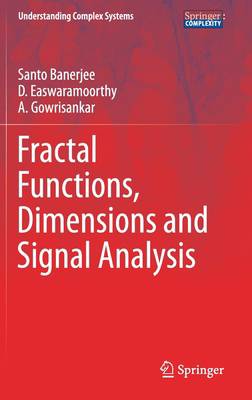
- Retrait gratuit dans votre magasin Club
- 7.000.000 titres dans notre catalogue
- Payer en toute sécurité
- Toujours un magasin près de chez vous
- Retrait gratuit dans votre magasin Club
- 7.000.0000 titres dans notre catalogue
- Payer en toute sécurité
- Toujours un magasin près de chez vous
137,45 €
+ 274 points
Format
Description
This book introduces the fractal interpolation functions (FIFs) in approximation theory to the readers and the concerned researchers in advanced level. FIFs can be used to precisely reconstruct the naturally occurring functions when compared with the classical interpolants.
The book focuses on the construction of fractals in metric space through various iterated function systems. It begins by providing the Mathematical background behind the fractal interpolation functions with its graphical representations and then introduces the fractional integral and fractional derivative on fractal functions in various scenarios. Further, the existence of the fractal interpolation function with the countable iterated function system is demonstrated by taking suitable monotone and bounded sequences. It also covers the dimension of fractal functions and investigates the relationship between the fractal dimension and the fractional order of fractal interpolation functions. Moreover, this book explores the idea of fractal interpolation in the reconstruction scheme of illustrative waveforms and discusses the problems of identification of the characterizing parameters.
In the application section, this research compendium addresses the signal processing and its Mathematical methodologies. A wavelet-based denoising method for the recovery of electroencephalogram (EEG) signals contaminated by nonstationary noises is presented, and the author investigates the recognition of healthy, epileptic EEG and cardiac ECG signals using multifractal measures.
This book is intended for professionals in the field of Mathematics, Physics and Computer Science, helping them broaden their understanding of fractal functions and dimensions, while also providing the illustrative experimental applications for researchers in biomedicine and neuroscience.
The book focuses on the construction of fractals in metric space through various iterated function systems. It begins by providing the Mathematical background behind the fractal interpolation functions with its graphical representations and then introduces the fractional integral and fractional derivative on fractal functions in various scenarios. Further, the existence of the fractal interpolation function with the countable iterated function system is demonstrated by taking suitable monotone and bounded sequences. It also covers the dimension of fractal functions and investigates the relationship between the fractal dimension and the fractional order of fractal interpolation functions. Moreover, this book explores the idea of fractal interpolation in the reconstruction scheme of illustrative waveforms and discusses the problems of identification of the characterizing parameters.
In the application section, this research compendium addresses the signal processing and its Mathematical methodologies. A wavelet-based denoising method for the recovery of electroencephalogram (EEG) signals contaminated by nonstationary noises is presented, and the author investigates the recognition of healthy, epileptic EEG and cardiac ECG signals using multifractal measures.
This book is intended for professionals in the field of Mathematics, Physics and Computer Science, helping them broaden their understanding of fractal functions and dimensions, while also providing the illustrative experimental applications for researchers in biomedicine and neuroscience.
Spécifications
Parties prenantes
- Auteur(s) :
- Editeur:
Contenu
- Nombre de pages :
- 132
- Langue:
- Anglais
- Collection :
Caractéristiques
- EAN:
- 9783030626716
- Date de parution :
- 15-12-20
- Format:
- Livre relié
- Format numérique:
- Genaaid
- Dimensions :
- 156 mm x 234 mm
- Poids :
- 381 g

Les avis
Nous publions uniquement les avis qui respectent les conditions requises. Consultez nos conditions pour les avis.






